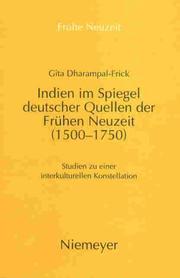| Listing 1 - 3 of 3 |
Sort by
|

ISSN: 09345531 ISBN: 3484365188 3110938685 Year: 1994 Volume: Bd. 18 Publisher: Tübingen Niemeyer
Abstract | Keywords | Export | Availability | Bookmark
 Loading...
Loading...Choose an application
- Reference Manager
- EndNote
- RefWorks (Direct export to RefWorks)
-Indic influences. --- Germany --- India --- Weimar Republic --- Germanii︠a︡ --- Германия --- BRD --- FRN --- Jirmānīya --- جرمانيا --- Nimechchyna --- Gjermani --- Federalʹna Respublika Nimechchyny --- Veĭmarskai︠a︡ Respublika --- Ashkenaz --- Germanyah --- Bundesrepublik Deutschland --- Federal Republic of Germany --- Deutschland --- Repoblika Federalin'i Alemana --- República Federal de Alemania --- Alemania --- República de Alemania --- Bu̇gd Naĭramdakh German Uls --- Kholboony Bu̇gd Naĭramdakh German Uls --- KhBNGU --- ХБНГУ --- German Uls --- Germania --- Republika Federal Alemmana --- Deutsches Reich --- Grossdeutsches Reich --- Weimarer Republik --- Vācijā --- Germany (Territory under Allied occupation, 1945-1955) --- Germany (Territory under Allied occupation, 1945-1955 : British Zone) --- Germany (Territory under Allied occupation, 1945-1955 : French Zone) --- Germany (Territory under Allied occupation, 1945-1955 : Russian Zone) --- Germany (Territory under Allied occupation, 1945-1955 : U.S. Zone) --- Germany (East) --- Germany (West) --- Holy Roman Empire --- Indland --- Ḣindiston Respublikasi --- Republic of India --- Bhārata --- Indii︠a︡ --- Inde --- Indië --- Indien --- Sāthāranarat ʻIndīa --- Yin-tu --- Bharat --- Government of India --- インド --- Indo --- Civilization --- Indic influences. --- Relations --- Civilization. --- ドイツ --- Doitsu --- ドイツ連邦共和国 --- Doitsu Renpō Kyōwakoku --- Indic influences --- هند --- Индия --- ドイツ レンポウ キョウワコク --- Deutschland. --- Geschichte 1500-1750. --- Indienbild. --- LITERARY CRITICISM / General. --- Deguo --- 德国 --- Gėrman --- Герман Улс
Book
ISBN: 0472904221 047203488X 9780472904228 Year: 2011 Publisher: Ann Arbor : University of Michigan Press,
Abstract | Keywords | Export | Availability | Bookmark
 Loading...
Loading...Choose an application
- Reference Manager
- EndNote
- RefWorks (Direct export to RefWorks)
Establishes the homosocial dynamics of colonial desire as evidenced in Orientalist narrative.
Englisch --- Geschlecht --- Indienbild --- Geschlechterrolle --- Kolonialliteratur --- Politics and government --- English literature. --- Litterature anglaise --- English literature --- Histoire et critique. --- History and criticism. --- Grossbritannien --- Indien --- India. --- Inde --- India --- Politique et gouvernement --- Histoire --- History --- British literature --- Inklings (Group of writers) --- Nonsense Club (Group of writers) --- Order of the Fancy (Group of writers) --- Kolonie --- Postkoloniale Literatur --- Gender --- Geschlechtsrolle --- Soziales Geschlecht --- Soziale Rolle --- Geschlechtsunterschied --- Bild --- Motiv --- Britisches Englisch --- Englische Sprache --- Nordseegermanische Sprachen --- Bharat --- Bhārata --- Government of India --- Ḣindiston Respublikasi --- Indi --- Indii͡ --- Indland --- Indo --- Republic of India --- Sāthāranarat ʻIndīa --- Yin-tu --- Indische Union --- Altindien --- Hindustan --- Hindostan --- Indie --- Indian Union --- Bhārata Gaṇarājya --- Bhārata --- Republik Indien --- Dominion of India --- Indië --- Bharata --- Indiia --- Hindiston Respublikasi --- Satharanarat 'India --- Inder --- Britisch-Indien --- Südasien --- 15.08.1947 --- -Vereinigtes Königreich von Großbritannien und Nordirland --- Großbritannien und Nordirland --- England --- UK --- Angleterre --- Brīṭāniyā al-ʿUẓmā --- Brīṭāniya 'l-ʿUẓmā --- Vereinigtes Königreich Großbritannien und Nordirland --- United Kingdom --- United Kingdom of Great Britain and Northern Ireland --- Great Britain --- Grande Bretagne --- British Isles --- United Kingdom of Great Britain and Ireland --- Royaume-Uni --- Gran Bretagna --- U.K. --- GB --- Grande-Bretagne --- British Empire --- Britisches Reich --- Briten --- Schottland --- Commonwealth --- 1707 --- -Politique et gouvernement --- Englisch. --- Geschlechterrolle. --- Kolonialliteratur. --- Politics and government. --- Großbritannien. --- Indien.
Book
ISBN: 3781558274 3781523950 Year: 2020 Publisher: Bad Heilbrunn Verlag Julius Klinkhardt
Abstract | Keywords | Export | Availability | Bookmark
 Loading...
Loading...Choose an application
- Reference Manager
- EndNote
- RefWorks (Direct export to RefWorks)
"1918" bezeichnet mehr als das Ende des Ersten Weltkriegs. Der Jahresbezug begründet häufig auch bildungsgeschichtliche Narrative. Hingegen fragt der Band nach Gleichzeitigkeiten von Zäsuren und Tradierungen, Brüchen und Kontinuitäten in regionalen, nationalen, europäischen und globalen Perspektiven. Er untersucht vielfältige Paradoxien vermeintlich alter und neuer pädagogischer Kulturen und Praktiken ebenso wie Ambivalenzen der Jugend zwischen Aufbegehren und Anknüpfung an Bildungsideale. Auch die Infragestellung von Schule und Pädagogik, ihre Relegitimierung sowie die Verflechtung von Sozialdemokratie und Sozialismus mit Bildungsreformen und -traditionen werden fokussiert. Damit zielt der Band auf den vielfach beschriebenen «Kampf der Ideologien» in der Zwischenkriegszeit und auf die Zirkulation konkurrierender Wissen, sodass er bildungshistorisch die komplexe Offenheit von 1918 diskutiert.
Erziehung
---
Zwischenkriegszeit
---
"Historische Bildungsforschung"
---
1918
---
"Kampf der Ideologien"
---
Erster Weltkrieg
---
Tagungsband
---
DGfE
---
Historische Bildungsforschung
---
Bildungsgeschichte
---
Geschichte
| Listing 1 - 3 of 3 |
Sort by
|

 Search
Search Feedback
Feedback About UniCat
About UniCat  Help
Help News
News